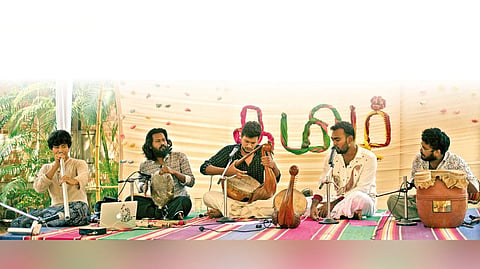

CHENNAI: Musician and instrument maker Tharun Sekar has been playing the yazh instrument for over two years, but he had the desire to start a music band of his own with traditional Tamil instruments. Earlier this year, Tharun and his musician friends formed a band named Uru, which plays traditional Tamil instruments and vocal performances that showcase the stories of thinai (five landscapes) as mentioned in Tolkappiyam, the ancient Tamil text. The band members joined us for a chat to talk about the formation of the band, what is the challenging part when compared to other indie bands and more.
“Tolkappiyam is the most ancient Tamil grammar text and the oldest extant long work of Tamil literature. Tolkappiyam mentions the various music pertaining to the five landscapes (thinai) of the Sangam literature. The five landscapes are associated with a particular mood of the poem and to give colour to these moods, each had a musical mood (pann), a melodic instrument (yazh) and a percussion instrument (parai),” Tharun explains.
KR Keerthi Rathan, who plays kudamuzha in the band, adds, “Each of us used to play different musical instruments, and when this band was formed, we started playing new instruments such as kudamuzha, parai, yazh and so on. We wanted to showcase our traditional instruments to the public through this band. People think folk music is always noisy, but we are proving it wrong. Uru aims to keep traditional Tamil music alive and accessible to modern audiences.”
The idea is to play traditional Tamil music with indigenous instruments. “Through Uru, people get to listen to different soundscapes of various old instruments. Each instrument has a natural sound to it, and when it all comes together and interprets the pann that is related to the landscape, there is a different feel to it,” says lyricist and singer Sivasubramanian.
Storyteller Kumar Shaw helps the team weave the stories as narration. “This is an experience-based performance, and the musicians should have good knowledge about what they are doing. All these instruments were there for more than 4,000 years. Tolkappiyam has the grammar on how the music should be, and how a story should be. We are following the same grammar and recreating the same experience. We also make sure that it remains timeless. We are not recreating the old music - as artistes, we interpret the music suitable to the present time. What is best about Tolkappiyam is that its grammar can be recreated in every era.”
The story of each performance starts with a welcome song and goes through each landscape based on time (morning to late night). When asked about the challenging part of playing with the instruments, Tharun says, “The challenging part would be the usage of instruments. Certain instruments such as kudamuzha are very tough to handle. In indie bands, there is a music reference for each instrument. But here we don’t have any such references. We have to refer to ancient books and learn by ourselves. We are recreating the music depending on older literature. Though we cannot recreate what they played during that period, we are trying our best to match the music.”
Visit news.dtnext.in to explore our interactive epaper!
Download the DT Next app for more exciting features!
Click here for iOS
Click here for Android